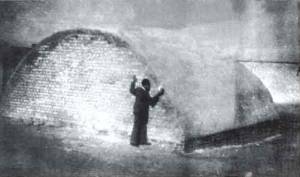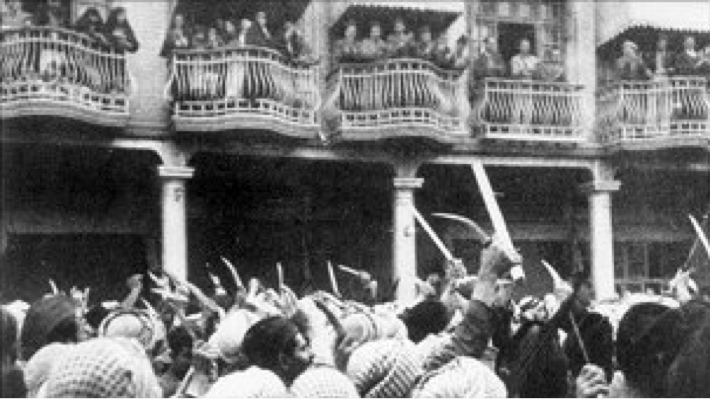Jewish organizations convened at the UN to declare June 1st “International Farhud Day” in commemoration of the WWII-era pogrom against the Jews of Baghdad, which set the stage for mass emigration in the 1950s.

A mass grave for the Farhud victims in Baghdad, June 1941. (Wikipedia/Israel Ministry of Education)
Representatives of the State of Israel and international Jewish organizations met at the UN Monday to declare International Farhud Day in commemoration of the 1941 pogrom that left 180 Baghdadi Jews dead and set the stage for the mass exodus of Iraqi Jews to Israel. The word Farhud is Iraqi Arabic for “violent dispossession.”
On June 1, 1941, on the holiday of Shavuot, Muslim rioters attacked the ancient Jewish population of Baghdad. The mob was buoyed by a combination of nationalist extremism in the wake of the Golden Square Coup against the British puppet regent and the large quantity of Nazi propaganda being pumped into Iraq, primarily via the Arabic radio station in Giessen. Many of the rioters belonged to al-Futuwa, a Hitler Youth-style organization funded by the German Embassy.
Over the course of two days, an estimated 180 Jews were killed and as many as 2,000 injured, in addition to the looting and destruction of homes and businesses. According to the Babylonian Heritage Center in Israel, besides the 180 identified victims, 600 unidentified people were buried in a mass grave.
The gathering at the UN included Israeli Deputy Permanent Representative to the UN David Roet, the Conference of Presidents of Major American Jewish Organizations, the European Jewish Congress, Justice for Jews from Arab Countries and the American Association of Jewish Lawyers and Jurists, among others.
Ambassador Roet said that the story of Farhud was “too long neglected and ignored” and is one that “many would wish remain forgotten.” The violence taught the Iraqi Jews that “anti-Semitism was not confined to their European brothers and sisters.”

Iraqi Jewish refugees arrive in Israel. (Jewish Virtual Library)
Many Iraqi Jews say Farhud influenced their decision to emigrate, primarily to Israel. Although the government temporarily protected the Jews after Farhud, it began to impose anti-Semitic policies in 1948 with the establishment of the State of Israel. The 150,000-member community did not wait. Despite the fact that Iraqi law required emigrating Jews to relinquish their citizenship and all of their property, nearly the entire Jewish population left Iraq between 1950 and 1953.
Farhud is only one episode of the suffering endured by Jews in Arab countries during the Holocaust. Nearly all of the Jews of North Africa came under the Nazi-controlled Vichy regime in France, while the Jews of Libya were already under Italian fascist rule. These communities suffered a stripping of rights, periodic violence and, in many cases, forced labor and imprisonment in concentration camps. An estimated 4,000-5,000 North African Jews died.










